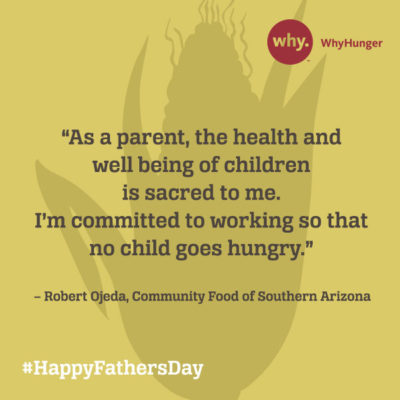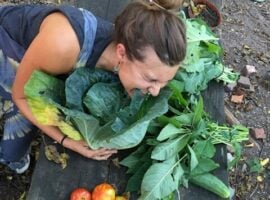To honor and celebrate Father’s Day we profiled a couple of our friends and allies in the food justice movement, who also happen to be awesome dads! Robert Ojeda, of the Community Food Bank of Southern Arizona, and Michael Hurwitz of GrowNYC’s Greenmarket Program. We asked them about how being a father has influenced their approach to working within food justice and what recommendations they have for engaging youth in the movement for a better food system. Check out their answers below and enjoy!
Robert Ojeda, Chief Program Officer at the Community Food Bank of Southern Arizona
How has being a father affected your approach to and perspective of your work within food justice?
Hunger is a very personal thing for me. When I was young, my dad developed brain cancer, so my mom was the breadwinner for the family. She was a hard-working teacher and we never went hungry, but I know it was a struggle for her. I think it can be humiliating to have to ask others for help when a person works hard, so I’m passionate about upholding dignity. As a parent of two children, I now understand and empathize with mother’s many sacrifices. Being a father has also helped me understand the many pressures families face. As a parent, the health and well being of children is sacred to me. While I’m committed to working so that no child goes hungry today, I believe that our children will only have a bright future if we address the root causes of hunger and poverty in our communities.
As a father and an activist, what recommendations do you have for engaging young people in the movement for a better food system? 
I think we need to make sure we create spaces for their perspectives/knowledge to be heard. We should invest in creating critical learning opportunities that connect them with food workers, farmers/producers, and consumers, etc. We should also work with youth to make sure they have the right tools and resources to effective participate in public/civic life.
Does your family have a favorite meal to make and eat together?
For the last few years we’ve been making pizzas together. My kids love to play with the dough; we laugh, sing, and even dance throughout the process. I grew up in Peru, and my grandfather was a storyteller who loved to recount tales through rhymes. We would sit encircled in candlelight (there was no electricity in the village where he lived), have a great meal, and listen to his amazing stories. I hope one day my children have fond and joyful memories when it comes to the ritual of sharing a meal.
——————————————————————————————————————
Michael Hurwitz, Director, Greenmarket a Program of GrowNYC
How has being a father affected your approach to and perspective of your work within food justice? 
Being a father reaffirms what motivated me to originally embrace this work- I didn’t know much about food (in)justice until I was in my 20’s and working alongside an incredible group of young adults in a community garden in Brooklyn. It was with them that I learned the transformative power of agriculture and understood that the answers to who grows our food, how it’s grown and for who it’s grown define what it is to be a just and resilient society. I want my children to participate in a system that prioritizes ALL of the individuals that produce our food, and not one that sees them as interchangeable parts along a supply chain. I want them to understand that we are guests in this world and that the land that sustains us is to be valued and protected. And I want them to fight to ensure that just as they delight in discovering new tastes and cuisines, all of their classmates should have the same privilege. So I want to model for them what’s important and how to be active participants in this work and in all aspects of their lives.
As a father and an activist, what recommendations do you have for engaging young people in the movement for a better food system?
No to sound cliché but young people are the best shot we have of reclaiming our food system. I spent years growing food alongside teenagers, learning with them about intercropping, harvesting techniques, setting up a market stand- it was also at their side that I first explored the causes of the Famine in Bengal, about disparities in access—and they get it and call it for what it is. And when those dynamic youth led tours for the elementary school kids, and those kids ate real spinach out of the ground- they wanted more.
We so often write off our youth and question their motivation and capacity—and that is simply a reflection of our limitations and failure of imagination as adults. The earlier we get young people’s hands in the soil, and engage them around complicated issues- the sooner we begin to bring about the changes we need to see in our food system. They are fearless critics and thinkers, curious minds that have not yet been jaded and told what’s not possible and aren’t afraid to take risks. My recommendations: dirty fingernails, new foods, cross cultural and inter-generational learning- and get them together with as many other young people who are doing positive work often and get out of the way.
Does your family have a favorite meal to make and eat together?
Prior to 3 weeks ago when my second child joined his older brother in vegetarianism, slow-braised meat products were regular Sunday activities. My boys love being in the kitchen and now that their diets are a bit more restricted- homemade pizza and bean tacos it is.






